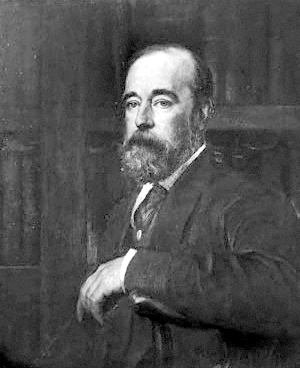1923
The House of Smith
Elder
|
 |
|
George Murray Smith (1824-1901) was a publisher well known to Wilkie Collins.
He took over his father firm Smith, Elder in 1846 and published After
Dark in 1856. In 1861 he won
the bidding war for Wilkie's next novel but one which became Armadale,
published in his new Journal The Cornhill Magazine and in two
volumes in 1866. In the 1870s he re-published one volume editions
of several of Wilkie's books.
In 1899 the Australian writer William Henry Fitchett (1841-1928) visited
England and wrote down George Smith's reminiscences.
They were never published but this book by family friend Leonard Huxley
relied heavily on them. |
In December
1864, overlapping “Denis Duval,” “Armadale” began, a story in twenty numbers
from the pen of Wilkie Collins, which in critical estimation upheld the
reputation of a skilful weaver of plots which he had won with “The Woman in
White” and “The Moonstone.” (p92)
...
George Smith’s introduction to
Wilkie Collins came through Ruskin, who must have known Collins’ father, the
R.A. Ruskin one day brought George Smith the MS. of Collins’ novel, “Antonina.”
But a novel with a classical subject was not tempting, and it was declined.
However, when he was writing “The Woman in White,” Smith, Elder wrote that they
would like to make an offer for the book, which appeared serially in All the
Year Round. In January 1860, Wilkie Collins received an offer from another firm,
and wrote to give Smith, Elder their promised opportunity.
George Smith had not read the
serial of what was probably the most popular novel issued during the century,
and the sequel, as told in his own words, illustrates his remark that “My life
was crowded with so many, and such diverse interests, that not seldom in
publishing matters I had to decide things in what may be called a happy-go-lucky
manner; and sometimes this cost me dearly.”
“On receiving Wilkie Collins’
letter (he writes) I asked three or four of my clerks if they had read the tale,
but none of them knew anything about it. Wilkie Collins had asked for an early
decision; I had to go out to dinner that night, and I dictated a hasty note,
making him an offer of £500, and told my clerk to send the letter off.
“The lady sitting beside me at
dinner that night was a bright and lively talker, and she somewhat startled me
by asking, ‘Have you read that wonderful book “The Woman in White”?’ I said,
‘No, have you? ‘ ‘Oh, yes!’ she said, ‘everybody is raving about it. We talk
“Woman in White” from morning till night!’ If I had heard that piece of gossip a
couple of hours earlier, it would have multiplied my offer to Wilkie Collins
fivefold.
“I went to town earlier than
usual next morning, and asked directly I reached my office, ‘Have you sent that
letter to Mr. Wilkie Collins?’ ‘Yes,’ was the reply; ‘you said you wanted it
sent quickly and it was delivered by hand.’ If my offer had been multiplied
tenfold I should have made a large sum by the transaction; but my hasty original
offer cost me the pleasure and profit of publishing * The Woman in White.’“
However, George Smith published
all his later books, and took over Sampson Low’s interest in the books already
published by them. “Armadale” was written for the
Cornhill, appearing from October 1864
onwards. Wilkie Collins had indeed arranged to contribute to the first number,
but though he had “honestly tried” to write Smith, Elder an article, he gave up
the attempt because, owing to the pressure of other work, he found it impossible
to do justice alike to Smith, Elder and to himself. Subsequently, though Wilkie
Collins’ books were selling very fairly,
“their writer believed he might
secure a much larger constituency of readers. The books, he was persuaded, would
have an enormous sale if published at a very cheap price. Wilkie Collins, in a
word, almost—though not quite—anticipated the modern sixpenny editions. He
wished to publish his books not exactly at that low rate, but for a shilling or
two shillings—I forget which. I did not share Wilkie Collins’ views on the
subject, and said I would not have any part in an enterprise which, I believed,
would land him in a disappointment. His books were, accordingly, transferred to
Messrs. Chatto & Windus, and the experiment of cheap editions was tried. Whether
the result quite satisfied Wilkie Collins himself I do not know, but it is
possible that my judgment as to the policy of low-priced editions was wrong.
(pp152-154)
Leonard Huxley The House of Smith Elder
Privately Printed 1923.
go back to biographies list
go back to Wilkie Collins front page
visit the Paul Lewis front page
All material on these pages is © Paul Lewis 1997-2010
